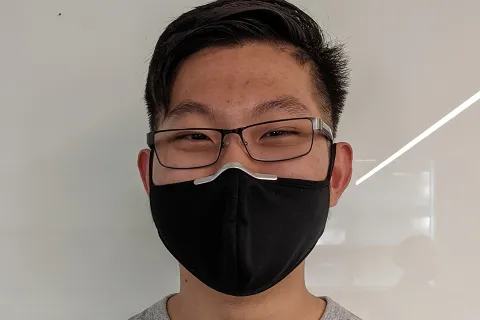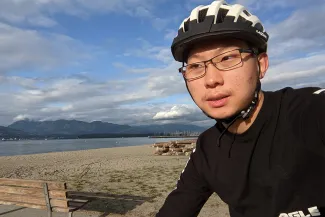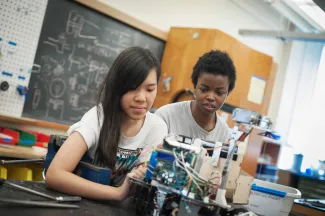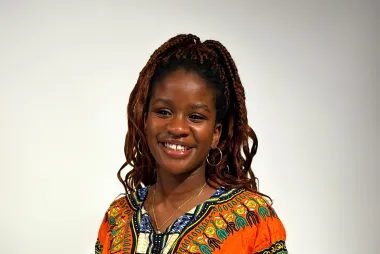"The opportunities we seek and the people we choose to surround ourselves with define who we will become. Put otherwise, we are the sum of our experiences and the product of our environment."

James Wu
- Degree:
- Bachelor of Applied Science
- Grad year: 2022
- Program:
- Campus: Vancouver
I am an Engineering Physics alumnus with an interest in pursuing a research career in condensed matter physics. I am from Coquitlam and have commuted to and from there throughout my time at UBC, while my parents are both immigrants from China. I attended high school in Vancouver, however, at the University Transition Program. Admittedly, I struggled grades-wise in high school a fair bit, though I enjoyed my classes there. Going into UBC, however, everything clicked for me and the campus environment helped me succeed both academically and professionally, having obtained the Governor General’s Silver Medal for top undergraduate performance as well as getting to be involved in five different research projects. This summer, I will be moving to the San Francisco Bay Area to pursue a PhD in physics at UC Berkeley.
When the weather is nice, I enjoy running, hiking, and biking. Otherwise, I like reading about psychology, economics, esoteric subfields in math, and any other topic I happen to be interested in on a whim.

Why did you choose to go into your field of study at UBC?
My desire to study engineering at UBC stemmed from my enjoyment of learning math and physics in high school. Following this, the manifold opportunities in my first year allowed me to explore a wide range of engineering opportunities, such as experiencing design team workflows through UBC Rocket, building electromechanical systems in APSC 101, and connecting in departmental open houses. All of this helped inform my decision of picking Engineering Physics as my particular specialization.
I initially became interested in pursuing physics research through taking a course under, and ultimately working part-time with, Professor Mona Berciu. I went further down this route by taking on quantum computing projects in the two Capstone courses the Engineering Physics program offers. Elsewhere, I took advantage of the flexibility of my degree in choosing technical electives, as well as the excellent variety of senior courses in UBC’s Physics department. As a result, I got to study advanced quantum mechanics and solid-state physics, as well as undertake an honours thesis in computational polymer physics.
What has made your time at UBC memorable?
I do not think I could have asked for a better set of peers than the ones I have in Engineering Physics. The standard timetables for the core curriculum have brought us together both physically and emotionally, providing a reassuring sense of camaraderie throughout the semesters. Even after graduating, I am still in close contact with many of my former classmates.
One great aspect of Engineering Physics, as well as UBC as a whole, is that the people here come from all walks of life. From being a shy and quiet kid in high school, I feel that I have socially matured quite a bit from building plenty of relationships with awesome people on campus these past few years.
Tell us about your experience in your program. What have you learned that is most valuable?
Especially in these past few years, I have been able to appreciate the importance of perseverance, and how one grows from pushing through adversity. For example, the rigorous curriculum in Engineering Physics is certainly challenging, but also very rewarding when completed, as it gives students a wealth of knowledge. Meanwhile, I was able to learn a lot about HTTP requests and software design patterns when working as a backend development intern at SAP only because I was focused on resolving an issue; this would not be the case if I gave up and let my supervisor take care of it while I worked on something I was more familiar with.
Staying determined is also especially important in research, where a series of negative results or technical difficulties can make a project frustrating. In fact, nearly every project in both research and engineering will face roadblocks at some point. It would not be inaccurate to say that success stories are simply stories of perseverance.
What advice would you give a student entering your degree program?
Venture outside of your comfort zone and talk to others. Although it may be easy to cruise through your degree in autopilot mode and focus only on degree requirements, a lot of the best opportunities I had came from reaching out to others. Even when there is no immediate venture to pursue with someone, having them in your network can turn out to be useful in the future and lead you to meet other people.
This is particularly important for job-seeking. Anecdotally, many of my classmates who work in industry have found their positions through personal connections. Finally, contacting people more senior than you might feel a bit intimidating at first–as was the case for myself. However, it is important to get over this fear, and you will become more confident in reaching out to people the more you do it.
How do you feel your degree has benefitted you compared to a different field of study?
Despite going into physics research, I have completed an Engineering Physics degree rather than a pure Honours Physics degree. While both programs offer a similar amount of breadth and depth in math and physics theory, the numerous engineering projects I have done have trained me in project management and execution. These skills are especially important in research, where it is easy to waste time digging into rabbit holes due to the open-ended nature of the projects. By judiciously scoping project goals and systematically planning out timelines, I am able to stay on track and more readily reach project completion. I have cultivated these skills in large part thanks to the Engineering Physics Project Lab, which offers specific mentoring in this area through my program’s two Capstone courses.
Otherwise, technical engineering proficiencies such as practice in software development and testing, sensor-microcontroller interfacing, and documentation habits are also quite useful in research.
How did your studies in the Faculty of Applied Science prepare you for the future of work?
A key takeaway I have from studying engineering is the value of lifelong learning. The ever-evolving nature of technology necessitates the need to continuously adapt one’s knowledge base. This is particularly true for research, as new breakthroughs emerge every year. On a longer timescale, the way research is performed also changes. For example, the advent of computers in the past few decades has fostered the use of numerical methods in condensed matter theory research. Meanwhile, quantum computing appears to be a promising resource in the next few decades, and it is thought that many-body quantum physical systems can be much more efficiently simulated on quantum computers compared to classical ones. In this case, my lifelong learning would likely include quantum software development.



